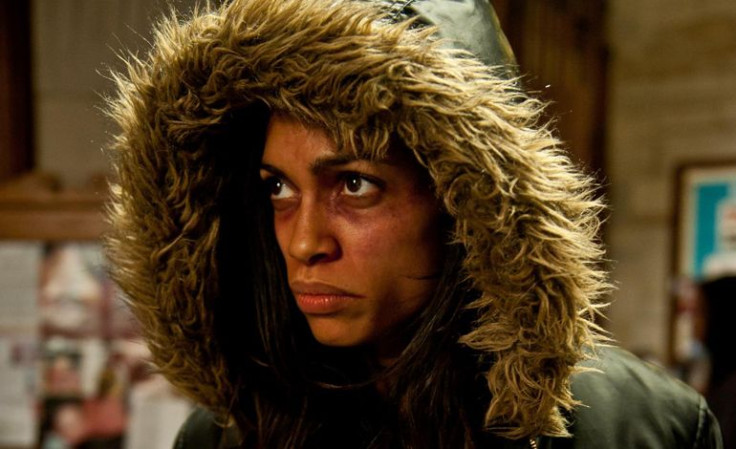
Rosario Dawson is set to be a busy actress this year with over five projects to be released in 2014, ranging from her highly anticipated portrayal of Dolores Huerta in “Cesar Chavez: An American Hero" to reprising her role as Gail in “Sin City: A Dame To Kill For,” as well as the film that Dawson herself produced “Parts Per Billion.” But the first film that marks her hectic year is “Gimme Shelter,” the movie is inspired by true events as Dawson transforms like we’ve never seen before, both psychically and emotionally.
RELATED: Read Our Vanessa Hudgens 'Gimme Shelter' Interview
The naturally stunning and alluring actress has reinvented herself for the Ron Krauss directed film, where she stars alongside Vanessa Hudgens as June Baily. Despite their nine-year age difference, Dawson plays Hudgens crack addicted mother, abuser and enabler. Hudgens is the daughter in this desperate situation. She brings to life the real life story of a homeless teen, who soon discovers she is pregnant. Her real name is Agnes, however in a letter from her estranged father, he refers to her as "the Apple of his eye," and she uses this moniker instead.
Latin Times was able to sit down with Rosario Dawson to discuss not only the significance of her specific role in “Gimme Shelter” but also the intended overarching message that audiences will discover after watching the film. “Gimme Shelter,” which hits theaters today, Jan. 24, features a nearly unrecognizable Dawson, with severely rotten teeth, unkempt hair and the slowly decaying and aging face of a drug addict. However, the true depiction and rawness of her character’s facade was refreshing for Dawson.
How did you feel about your changed appearance for this film?
RD: It’s pretty full on, and it’s great. I’m excited about that, because I grew up around what crack addiction does to people psychically. I was grateful that everyone did their homework, and was ready to take it to that level. We didn’t even have to have that conversation. When I arrived on set the enamel for my teeth were already there.
What was the most challenging aspect of your role as June Bailey?
RD: How much the role of actually stayed with you. I have played some pretty heavy, dark, cynical characters over the years. I felt like Gollum, the role was really just a thing that just stayed with me.
An iconic scene in the film takes place between June and Apple in the hospital, where the drug-addicted mother delivers an extensive monologue of her life, her experience and really who she was, stayed with Dawson.
RD: Twenty four hours later, I was in the shower and I was washing my face, and my hands were contorted, my faces was contorted. The role just really stayed with me, it was really interesting to see how it physically changed me. I don’t think I’ve ever taken a role home like I did with June Bailey.
How do you hope this film changes society’s view on teen pregnancy?
RD: I don't know if “Gimme Shelter” is really about teen pregnancy. I think the film is about people reaching out to people and being a support system, Vanessa’s character Apple is really similar to the role of Mimi in “Rent” without family, she didn’t get HIV/AIDS, she got pregnant. She had no resources around her to support, and that idea of “it takes a village” is really not just for the baby, it’s for the parents as well. My mom worked at a shelter when I was about 10 years old and she was that person who really had no resources to give, but was there for women to open up the door and say, “I care.”
Apple runs away from her drug addicted mother, in a bid to find her father who she credits with naming her “Apple.” Upon discovering him, Apple soon realizes the Wall Street mogul has a new family, complete with a wife and two children. In order for Apple to stay with them, they insist she undergo an abortion. However, after a sonogram, the 16-year-old is unwilling to give up her child. After a botched escape from the abortion clinic, Apple finds herself in the hospital where she begrudgingly befriends a kind priest, portrayed by James Earl Jones. While their relationship is tension filled, the priest directs her to a church-sponsored home for pregnant teens run by Kathy DiFiore.
RD: The film is really about chosen family. It’s about these labels that we put on people who get marginalized by society. My mom was teenage mom, so I’m an anomaly, I really should not be who I am, but I was just loved, which was the difference. Circumstances are really difficult, but you can transcend them, and that's what I really think this film is about.
© 2025 Latin Times. All rights reserved. Do not reproduce without permission.






